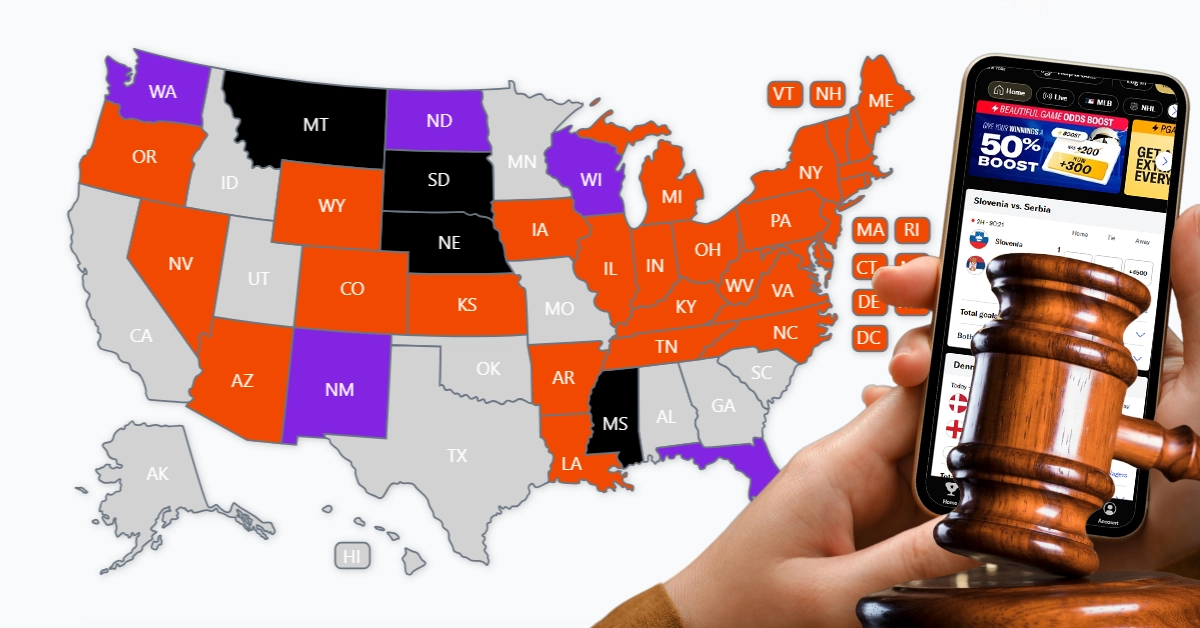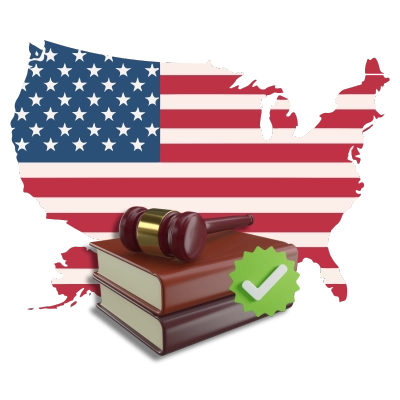The Legal Implications of Online Gambling Across Different States

Did you know that the U.S. online gambling market is projected to reach a whopping $100 billion by the end of 2024? As more and more Americans open up their smartphone apps to get their dose of entertainment and the prospect of winning big money, the legal landscape surrounding online gambling remains as varied as the states themselves.
Because in the U.S., the legality of online gambling is most definitely not one-size-fits-all—every state has its own set of rules, regulations, and restrictions that can make accessing and playing pretty confusing. Even if you’re an experienced gambler, you still need to know the rules and legal differences from where you want to play.
That’s why we are going to make it crystal clear what the state-specific gambling laws are so you can avoid getting into any legal snafus or gray areas—that way, you can protect your loot and make informed decisions about where and how to play!
Overview of Online Gambling Legislation in the U.S.
The United States uses a dual legal framework for online gambling, meaning that federal laws provide the overarching guidelines while individual states have the power to regulate or prohibit gambling within their borders. This system creates some issues—federal and state laws intersect and can sometimes be in conflict.
Federal Laws
Federal laws set the foundation for online gambling regulations, primarily through two key pieces of legislation: The Wire Act and the Unlawful Internet Gambling Enforcement Act (UIGEA).
- The Wire Act of 1961: Initially aimed at curbing organized crime, the Wire Act prohibits the transmission of bets or wagering information across state lines via wire communication. For many years, it was interpreted to apply broadly to all forms of gambling. However, in 2011, the Department of Justice (DOJ) clarified that the Wire Act only applies to sports betting, opening the door for states to regulate other forms of online gambling, such as poker and casino games.
- The Unlawful Internet Gambling Enforcement Act (UIGEA) of 2006: UIGEA focuses on the financial transactions related to online gambling, making it illegal for businesses to accept payments related to unlawful Internet gambling knowingly. While UIGEA does not define what constitutes illegal internet gambling, it defers to state and federal laws to make this determination. This act has significantly impacted how online gambling sites operate, particularly concerning payment processing.
State-Specific Regulations
While federal laws provide a broad framework, states have the autonomy to craft their own regulations regarding online gambling. This has led to a varied legal landscape across the country, with some states embracing online gambling and others strictly prohibiting it.
States like New Jersey, Pennsylvania, and Michigan have fully legalized and regulated online casinos and poker, creating robust markets that generate significant tax revenue. Conversely, states like Utah and Hawaii have taken a hardline stance, prohibiting all forms of gambling. This state-by-state approach means that online gamblers have to be acutely aware of their specific state’s regulations to guarantee they are operating within the law.
Historical Context
The journey of online gambling legislation in the U.S. has been marked by big milestones and shifts in public and legislative attitudes. Understanding this history gives us valuable context for the current legal environment!
| Event | Details |
|---|---|
Early Days and the Rise of Online Gambling | Online gambling began to emerge in the mid-1990s, facilitated by the advent of the Internet. The first online casinos and poker rooms appeared, operating in a largely unregulated environment. As the popularity of these platforms grew, so did concerns about their legality and the potential for abuse. |
The Wire Act and Early Regulatory Efforts | The Wire Act of 1961 initially served as the primary tool for federal authorities to combat illegal gambling operations. However, its applicability to online gambling remained a gray area for many years. In the absence of clear federal guidance, states began to explore their own approaches to regulating or banning online gambling. |
The UIGEA and the Black Friday Crackdown | The UIGEA of 2006 represented the federal effort to curb online gambling by targeting the financial transactions that enabled it—this act led to the withdrawal of many online gambling operators from the U.S. market, particularly those focused on poker. |
State Legalization and the Post-Black Friday Era | Following Black Friday, there was a push from both players and operators for a clearer and more friendly legal framework. In 2011, the DOJ’s clarification that the Wire Act only applied to sports betting was a pivotal moment—this reinterpretation allowed states to consider legalizing online gambling within their borders. |
States Where Online Gambling Is Legal
The U.S. has seen a surge in the legalization and regulation of online gambling across various states. This change reflects the growing acceptance and popularity of online gaming, which brings both economic benefits and enhanced entertainment options. Knowing where online gambling is legal and how it is regulated is a must for those who want to play safely and legally.
States with Comprehensive Legal Frameworks
Several states have established airtight legal frameworks for online gambling, including New Jersey, Pennsylvania, and Michigan. These states offer a variety of online gambling options, like casino games, poker, and sports betting.

- New Jersey: A pioneer in legal online gambling, New Jersey legalized online casinos and poker in 2013. The state now has a vibrant market with numerous operators offering a wide range of games. Players can enjoy online slots, table games, poker, and sports betting through platforms like BetMGM, DraftKings, and FanDuel.
- Pennsylvania: Following New Jersey’s lead, Pennsylvania legalized online gambling in 2017, with the first sites launching in 2019. The state provides online casino games, poker, and sports betting, with operators such as PokerStars, BetRivers, and Hollywood Casino.
- Michigan: Michigan entered the online gambling scene in 2021 and quickly became a major player. The state allows online casinos, poker, and sports betting, with popular platforms like BetMGM, DraftKings, and FanDuel offering their services.
In these states, online gambling regulation is stringent—licensing is overseen by state gaming commissions, requiring operators to meet high standards for fairness, security, and responsible gambling practices. This regulatory oversight helps protect players and maintain the integrity of the online gambling market.
Types of Legal Online Gambling
- Casino Games: Most states with legalized online gambling allow for a wide range of casino games, including slots, blackjack, roulette, and other table games.
- Sports Betting: Many states have embraced online sports betting, allowing residents to place bets on a variety of sports, including football, basketball, baseball, and more niche ones as well.
- Poker: Online poker is legal in several states, providing players with access to virtual poker rooms and tournaments.
Recent Legalizations
Several states have recently legalized online gambling, contributing to the industry’s rapid growth, including the following:
- Connecticut: In 2021, Connecticut legalized online casinos and sports betting. The state offers a limited number of licenses, with platforms like Mohegan Sun and DraftKings operating under strict regulatory frameworks.
- West Virginia: Legalized online casinos and poker in 2019, with sites launching in 2020. The state’s market includes operators such as BetMGM and DraftKings, offering a host of online gaming options.
- Rhode Island: Rhode Island has recently joined the ranks of states with legalized online gambling, launching its online casino operations in 2024. The state has introduced live-dealer games and other online casino offerings regulated by the Rhode Island Lottery.
The impact of these new laws has been substantial. States with newly legalized online gambling have seen market growth, increased tax revenues, and the development of a competitive industry landscape. For instance, Michigan’s online gambling market generated hundreds of millions in revenue within its first year, showcasing the economic potential of regulated online gaming.
The trend toward legalizing and regulating online gambling in the U.S. continues to grow, meaning players have more opportunities to engage in their favorite games safely and legally while providing states with valuable economic benefits.
States with Partial Legalization
While some states have fully legalized online gambling, others have opted for a more cautious approach, legalizing only certain forms. Let’s take a look at the states that have only legalized sports betting, and those that are dabbling in some online casino offerings.
Sports Betting Only
Several states have chosen to legalize only sports betting, leaving other forms of online gambling, like casino games and poker, outside the legal framework (fancy terminology for illegal). This strategy allows states to regulate and benefit from sports betting while minimizing potential risks associated with broader online gambling.

- Tennessee: Tennessee is unique in that it has legalized sports betting exclusively online, with no physical sportsbooks. This model has allowed the state to quickly grow its sports betting market. Tennessee’s regulatory framework is overseen by the Tennessee Education Lottery Corporation, which ensures compliance with state laws and regulations.
- Maryland: Maryland has legalized online sports betting but has not extended this to online casinos. The state’s cautious approach focuses on regulating sports betting to address potential issues such as gambling addiction and ensuring fair play. The Maryland Lottery and Gaming Control Agency oversees the regulation and licensing of sports betting operators.
- New York: New York launched online sports betting in early 2022, allowing residents to place bets through licensed operators. The state has not yet legalized online casino games, reflecting a measured approach to expanding online gambling. The New York State Gaming Commission regulates the sports betting industry to maintain integrity and protect consumers.
Limited Online Casino Games
And then we have the states that have chosen to permit online casino gaming but under super restricted conditions, allowing only specific games or platforms and maintaining tight regulatory control.

- Connecticut: Connecticut permits online gambling, including sports betting and a limited range of online casino games. The state has a regulated market with a few licensed platforms, such as Mohegan Sun and DraftKings. This approach allows the state to benefit economically while managing potential risks associated with gambling.
- Rhode Island: Rhode Island has recently introduced online casino gaming, including live-dealer games, under a tightly controlled regulatory framework. The Rhode Island Lottery regulates online gambling, ensuring the security and fairness of the gaming environment.
- Delaware: Delaware has a more comprehensive online gambling framework but limits the number of available platforms. The state operates a centralized system through the Delaware Lottery, which verifies that all online gambling activities are closely monitored and regulated.
The limitations on online casino offerings in these states help manage market size, address public concerns, and allow for incremental testing of online gambling. These measures help prevent issues such as gambling addiction and underage gambling while ensuring fair play and consumer protection.
Overall, the approach to partial legalization of online gambling swings back and forth across the U.S., reflecting each state’s distinct economic, cultural, and regulatory landscapes. As more states explore the potential of online gambling, it will be really interesting to see how these partial legalizations evolve and whether they lead to wider acceptance and expansion in the future!
States Where Online Gambling Is Illegal
Online gambling regulations in the United States are complex, with each state enacting its own laws. And while some states have welcomed at least some forms of online gambling, others have said “no way, Jose” and upheld super strict bans. Next up, we’ll see which states online gambling is completely prohibited, the reasons behind these bans, and the penalties for violating these laws.
Complete Bans
Three states enforce comprehensive bans on online gambling—Utah, Hawaii, and Washington. The motivations for these prohibitions are rooted in cultural, societal, and political factors.

- Utah: Utah is known for its strict stance against all forms of gambling. The prohibition is deeply ingrained in the state’s cultural and religious values, heavily influenced by the Mormon Church, which views gambling as morally unacceptable. Political and public support for maintaining these laws is strong, and no significant efforts exist to change them. This reflects a broader consensus in Utah against gambling based on concerns about its moral and social impacts.
- Hawaii: Similar to Utah, Hawaii maintains a total ban on gambling. The state’s opposition is driven by concerns over the potential social problems associated with gambling, such as addiction and crime. Cultural resistance to gambling is strong, and there has been little political momentum to legalize it despite discussions about the potential economic benefits. Efforts to introduce gambling have consistently failed, reflecting the state’s commitment to maintaining its anti-gambling stance.
- Washington: Washington has some of the strictest online gambling laws in the United States. Engaging in online gambling is classified as a felony, which carries severe penalties. The state’s stringent regulations aim to protect consumers and maintain public order. There is ongoing debate about whether these laws should be relaxed to allow regulated online gambling, but the laws remain in place for now.
Penalties for Illegal Gambling
The legal consequences for partaking in illegal online gambling are pretty severe and change from state to state. Penalties usually include monetary fines, imprisonment, and other legal repercussions affecting players and casino operators.
- Fines and Imprisonment: In states like Washington, individuals caught participating in illegal online gambling can face felony charges, resulting in heavy fines and potential imprisonment. Even in states with less severe penalties, such as Vermont and Virginia, individuals can still face misdemeanor charges, fines, and possible jail time. These penalties are put in place to deter illegal gambling activities and uphold the law.
- Impact on Players and Operators: The legal risks extend to both players and operators. For players, engaging in illegal online gambling can lead to criminal records, financial penalties, and the forfeiture of winnings. For operators, running illegal gambling sites can result in substantial fines, asset forfeiture, and imprisonment. These legal risks create a highly unfavorable environment for both participating in and facilitating online gambling in these states.
Societal, Political, and Economic Factors
As for the reasons behind the complete bans on online gambling in these states, they go back decades and are multifaceted:
- Cultural and Religious Values: In states like Utah and Hawaii, cultural and religious beliefs play a significant role in shaping attitudes toward gambling. The dominant religious groups in these states view gambling as morally wrong, influencing public opinion and political decision-making.
- Social Concerns: Concerns about the social impact of gambling, such as addiction, crime, and financial hardship, drive the strict regulations in these states. Lawmakers and citizens worry that legalizing online gambling could exacerbate these issues, leading to negative outcomes for individuals and communities.
- Economic Considerations: While some argue that legalizing gambling could bring economic benefits through taxation and job creation, opponents believe that the social costs outweigh these potential gains. The fear of increased crime, addiction, and other social problems often leads to a cautious approach, prioritizing social stability over economic benefits.
Case Studies
- Utah: Utah’s complete ban on gambling is rooted in its strong Mormon heritage. The state has never shown interest in legalizing any form of gambling, including lotteries, casinos, or online gambling. Efforts to introduce gambling laws have consistently failed, reflecting a strong societal consensus against it.
- Hawaii: Hawaii remains one of the few states with a total ban on gambling, and even though there have been talks about introducing lotteries or casinos that have taken place over the years, none have gained sufficient support to change the existing laws. The state’s isolation and unique cultural context contribute to its resistance to gambling legalization.
- Washington: Washington’s approach to online gambling is among the harshest in the nation, with felony charges for those who engage in it. The state’s focus is on consumer protection and maintaining public order, and there is ongoing debate about whether to relax these laws. For now, the strict penalties and enforcement actions reflect a commitment to preventing illegal gambling activities.
The strict prohibition of online gambling in certain states is driven by a complex interplay of cultural, societal, and political factors. The severe penalties for violating these laws underscore the high risks involved in engaging in illegal online gambling activities. As debates continue about the potential benefits of legalizing online gambling, it remains to be seen whether these strict prohibitions will eventually be relaxed. Understanding these laws and the associated risks is vital for anyone considering participating in online gambling in these states—don’t do it!
Legal Ambiguities and Gray Areas
As we’ve established, the legal status of online gambling in the United States can vary wildly from l state to state. While some states have clear regulations, others operate in murkier gray areas where the laws are ambiguous or still developing. The following are the states with unclear online gambling regulations and the challenges that this presents for both players and operators. Also, we’ll look at the role of Native American tribes in online gambling, highlighting the legal nuances arising from tribal sovereignty and state agreements.
States with Ambiguous Laws
Several states have unclear or changing laws regarding online gambling, which means uncertainty for both players and operators. These states usually lack any specific sort of legislation addressing online gambling, leaving it in a legal gray area.

- California: California has made some attempts to regulate online poker, but these efforts have repeatedly stalled in the legislature. While the state allows certain forms of gambling, such as horse racing and tribal casinos, online poker and casino games remain unregulated. This lack of clear legal guidance creates challenges for operators looking to enter the market and for players seeking legal online gambling options.
- Texas: Texas has strict prohibitions against most forms of gambling, including online casinos and poker. However, there are exceptions for social gambling and charitable gaming, which are not clearly defined in the state’s laws. This ambiguity leads to legal uncertainty and risks for both players and operators who may inadvertently violate the law.
- Massachusetts: Massachusetts has legalized online sports betting but remains ambiguous about online casino games and poker. The state has shown interest in expanding its gambling options, but legislative efforts have been slow, leaving the status of online casinos in the gray area.
Getting around some of these ambiguous legal landscapes is challenging indeed—operators have to carefully interpret state laws to avoid legal repercussions, while players face risks associated with participating in unregulated or potentially illegal gambling activities. The lack of clear regulations can mean inconsistent enforcement and legal disputes, making it necessary for both parties to stay educated about any ongoing legislative developments.
Tribal Lands and Online Gambling
Native American tribes play a huge part in the online gambling landscape in the United States—tribal casinos have long been a staple of the gambling industry, and their involvement in online gambling introduces even more convoluted legal issues.
- Role of Native American Tribes: Native American tribes operate numerous casinos nationwide under the Indian Gaming Regulatory Act (IGRA). This federal law allows tribes to operate casinos on their lands, provided they enter into contracts with state governments. These contracts outline the terms under which gambling can occur and often include provisions for revenue sharing and regulatory oversight.
- Legal Complexities: The introduction of online gambling by Native American tribes raises several legal issues. One major complexity is the concept of tribal sovereignty, which grants tribes a degree of self-governance and autonomy from state laws. This sovereignty allows tribes to operate casinos under federal law, but the situation becomes more complicated when it comes to online gambling. State laws typically regulate online gambling, but tribes may argue that their sovereignty allows them to provide online gambling without state approval.
For example, in states like California and Florida, tribes have sought to offer online gambling through their existing gaming contracts. These efforts often lead to negotiations and legal battles between tribes and state governments as both sides navigate the intricacies of federal, state, and tribal laws. Additionally, some states have granted tribes exclusive rights to operate online gambling, leading to agreements that change from state to state.
State Agreements: States that have reached agreements with tribes to allow online gambling often include provisions that address regulatory oversight, revenue sharing, and player protections. These agreements aim to balance tribal sovereignty with the need for a regulated and fair gambling environment. However, reaching such agreements can be challenging, as they require careful negotiation and often face opposition from various stakeholders.
Impact of State Laws on Players
State regulations in the U.S. absolutely affect online gambling players in terms of protections, rights, and tax obligations—knowing and understanding these aspects helps players play safely and comply with legal requirements!
1 – Player Protections and Rights
State laws play a large role in player safety and rights. States with regulated online gambling markets impose strict licensing requirements on operators to uphold a safe environment and protect players from fraud and unfair practices.
In states like New Jersey and Pennsylvania, online casinos have to undergo a rigorous licensing process, including operational plans, financial assessments, and background checks. These measures help maintain reputable and financially stable operators. Additionally, consumer protection measures like age verification and geolocation checks prevent underage gambling and verify only residents within state borders can participate.
Playing on licensed casino apps and platforms is essential for players. Regulated platforms have to adhere to fair play standards, provide secure payment methods, and offer decent customer support. They also implement measures to address problem gambling, like self-exclusion programs and deposit limits. These protections are not available on unregulated sites, where players face risks of fraud, non-payment of winnings, and a lack of recourse in any disputes they might have.
2 – Tax Implications
Another major impact of state laws on online gambling players involves paying the tax man. Different states have different tax rules for gambling winnings, and knowing these requirements is important to steer clear of any legal issues.
| State | Tax Rule |
|---|---|
New Jersey | All gambling winnings are subject to state income tax. Players must report their winnings on their state tax return, and the tax rate can vary based on the amount won. Additionally, players can deduct their gambling losses up to the amount of their winnings. |
Delaware | Gambling winnings are taxed at rates ranging from 2.2% to 6.6%, depending on the amount. Players can deduct their losses from their winnings but have to keep accurate records. |
Michigan | Players must report their gambling winnings and pay state income tax. The tax rate applies uniformly to all gambling winnings, and players can deduct their losses up to the amount of their winnings. |
These differences mean players need to keep thorough records of their gambling activities, including documentation of all winnings and losses. This is necessary for accurate reporting and claiming deductions when tax time rolls around.
3 – Reporting and Payment Requirements
State-specific tax obligations also include differences in reporting and payment requirements. In some states, operators must withhold taxes on large winnings and provide players with tax forms, such as the W-2G, which must be filed with both state and federal tax returns.
In states like Pennsylvania and New Jersey, operators must withhold federal taxes on winnings over a certain threshold and issue the appropriate tax forms to the players. Players are then responsible for including these winnings on their tax returns and paying any additional state taxes owed. States with less comprehensive regulations may place the reporting burden entirely on players.
Understanding these tax implications and requirements helps players remain compliant with state and federal laws—failure to report gambling winnings accurately can result in penalties, interest, and possible legal issues. Players should get guidance from tax professionals or consult state tax resources to make sure they meet all their obligations.
State laws have a substantial impact on online gambling players, influencing everything from player protections and rights to tax obligations and reporting requirements. Players can protect themselves by playing on licensed casino apps and being diligent about tax reporting, and enjoy a safer gambling experience.
The Future of Online Gambling Legislation
The future of online gambling legislation in the United States is marked by a mix of state initiatives, potential federal interventions, and the influence of advocacy and industry groups. Trends indicate a move towards increased legalization and regulation, driven by legislative efforts and the push for a safe, regulated gambling environment.
Various states are considering new legislation, and potential federal interventions could further shape the regulatory environment.
Trends and Predictions
Some states are on the cusp of legalizing and regulating online gambling—this push towards legalization is driven by the potential for serious tax revenue, consumer protection, and the desire to curb illegal gambling operations.
- New York: Efforts to legalize online casinos in New York are ongoing despite some recent setbacks. Senator Joseph Addabbo continues to advocate for the inclusion of online gambling in the state budget, emphasizing the potential economic benefits. However, the process is complex, requiring support from key figures like Governor Kathy Hochul.
- Illinois: Legislative efforts in Illinois to legalize online casinos have faced resistance, particularly from the video gaming terminal industry. Debates over the tax structure and regulatory framework continue, but proponents remain optimistic about future progress.
- Iowa: Although bills to regulate online casinos have been introduced annually since 2021, they have yet to gain significant traction. Support is growing, and future legislative sessions may see more serious consideration of these proposals.
Potential Federal Interventions or New Legislation
At the federal level, laws such as the Unlawful Internet Gambling Enforcement Act (UIGEA) and the Wire Act influence state decisions on online gambling. The repeal of the Professional and Amateur Sports Protection Act (PASPA) in 2018 was a major turning point, allowing states to legalize sports betting. Similar federal actions could impact online gambling, with ongoing discussions about the need for clear federal guidelines to streamline state regulations.
Advocacy and Industry Influence
Lobbying and advocacy groups play a pivotal role in shaping online gambling legislation—these organizations represent a range of stakeholders, from gambling operators to consumer protection advocates, and their efforts can greatly influence policy decisions.
- American Gaming Association (AGA): The AGA advocates for modernizing gaming laws and enhancing consumer protections. Their lobbying efforts focus on supporting the growth of legal and regulated online gambling while addressing concerns such as problem gambling and financial transparency.
- National Council on Problem Gambling (NCPG): The NCPG works to promote responsible gambling practices and provide support for individuals affected by gambling addiction. Their advocacy ensures that new legislation includes necessary protections for vulnerable populations.
Industry Perspectives: How Operators are Preparing for Changes
Online gambling operators are actively preparing for any and all possible changes in the legal landscape by investing in technology, forming strategic partnerships, and taking part in lobbying efforts.
- Technology and Compliance: Operators are investing in advanced technologies like geolocation services, age verification, and secure payment processing to meet regulatory standards. These technologies are essential for ensuring compliance and protecting players.
- Strategic Partnerships: Many operators are partnering with local entities, such as brick-and-mortar casinos, to navigate regulatory complexities and gain market entry. These partnerships help operators leverage existing infrastructure and local knowledge.
- Advocacy and Lobbying: Operators participate in industry groups and work with lawmakers to influence legislation. Their goal is to create a regulatory environment that supports growth while ensuring consumer protection and fair play.
Conclusion
Gambling laws are complicated! Depending on where you are, the legal framework will be different, so it’s up to you to find out and respect the rules! In that vein, here’s a recap of everything we covered about the legal intricacies when it comes to online gambling:
Federal Laws
- The Wire Act of 1961: Prohibits transmission of bets across state lines, originally applied broadly but now limited to sports betting.
- The Unlawful Internet Gambling Enforcement Act (UIGEA) of 2006: Targets financial transactions related to unlawful Internet gambling, relying on state and federal laws for definitions.
State-Specific Regulations
- States have autonomy to regulate or prohibit online gambling.
- New Jersey, Pennsylvania, Michigan: Fully legalized, regulated online gambling markets.
- Utah, Hawaii: Complete prohibition on all forms of gambling.
Historical Context
- 1990s: Emergence of online gambling, early regulatory efforts.
- 2006: UIGEA and its impact, including “Black Friday” crackdown in 2011.
- Post-2011: DOJ clarification of the Wire Act, leading to state-level legalization efforts.
States Where Online Gambling is Legal
- Comprehensive Legal Frameworks: New Jersey, Pennsylvania, Michigan.
- Types of Legal Online Gambling: Casino games, sports betting, poker.
- Recent Legalizations: Connecticut, West Virginia, Rhode Island.
States with Partial Legalization
- Sports Betting Only: Tennessee, Maryland, New York.
- Limited Online Casino Games: Connecticut, Rhode Island, Delaware.
States Where Online Gambling is Illegal
- Complete Bans: Utah, Hawaii, Washington.
- Penalties: Fines, imprisonment, legal risks for both players and operators.
Legal Ambiguities and Gray Areas
- Ambiguous Laws: California, Texas, Massachusetts.
- Tribal Lands and Online Gambling: Legal complexities due to tribal sovereignty and state agreements.
Impact of State Laws on Players
- Player Protections and Rights: Licensing requirements, consumer protection measures, fair play standards.
- Tax Implications: Vary by state; players need to report winnings and may deduct losses.
The Future of Online Gambling Legislation
- Trends and Predictions: States like New York, Illinois, Iowa considering legalization.
- Potential Federal Interventions: Discussions about federal guidelines to streamline state regulations.
- Advocacy and Industry Influence: Groups like AGA and NCPG shaping legislation.
- Industry Perspectives: Operators investing in technology, forming partnerships, and participating in lobbying efforts.
Final Thoughts
Being informed about legal developments in online gambling is a must for both players and operators. The legal landscape is always changing, and understanding the specific regulations in your state means you can have a safe and fun gambling experience. Awareness of these laws also protects against potential legal issues and increases the overall integrity of the online gambling market.
Stay updated on your state’s laws and regulations regarding online gambling sites! And don’t forget to make smart choices and always gamble responsibly in a regulated gaming environment. By keeping yourself in the loop and playing legally, you can protect yourself while adding to a fair and secure online gambling ecosystem.

Matthew specializes in writing our gambling app review content, spending days testing out sportsbooks and online casinos to get intimate with these platforms and what they offer. He’s also a blog contributor, creating guides on increasing your odds of winning against the house by playing table games, managing your bankroll responsibly, and choosing the slot machines with the best return-to-player rates.








